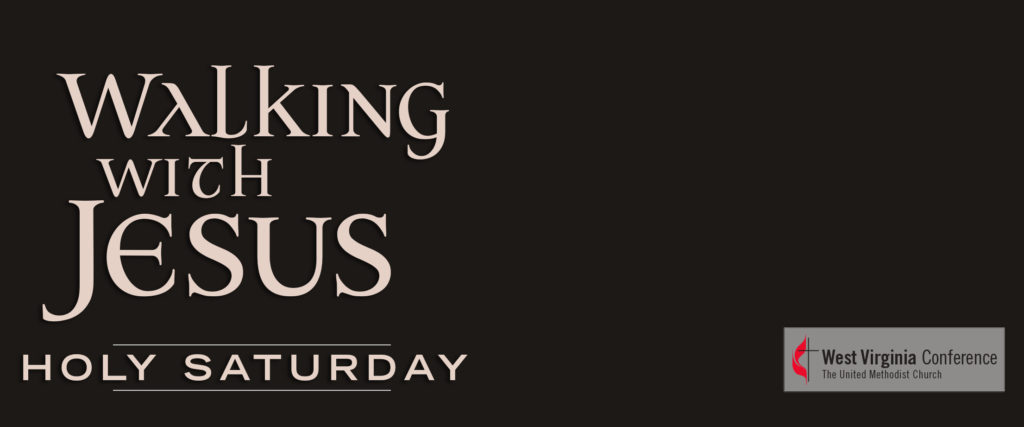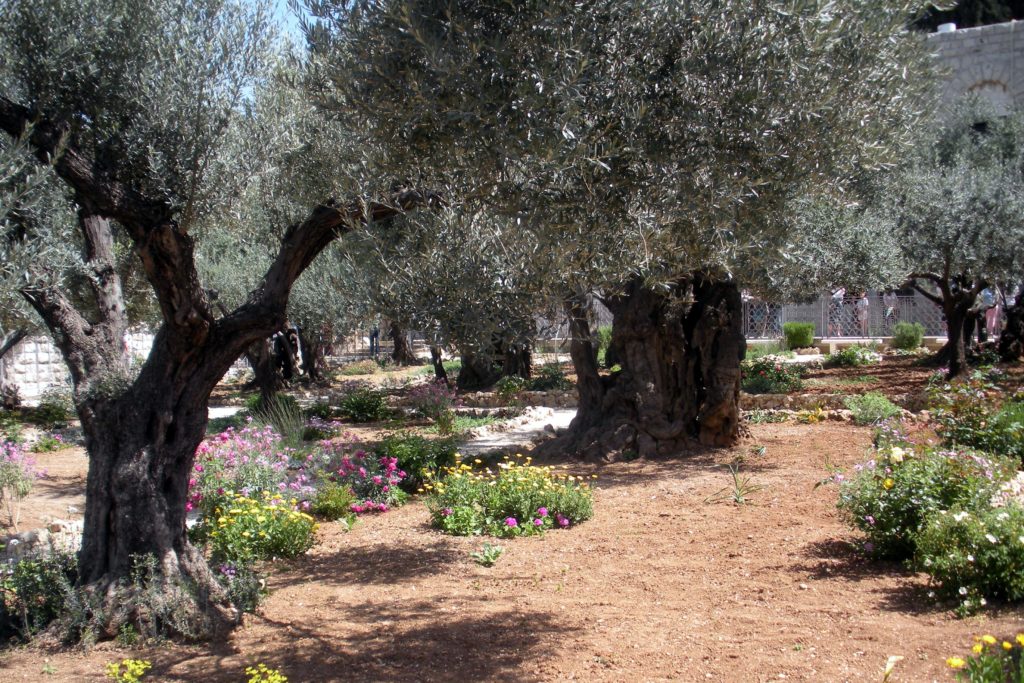
Lectionary Readings for the Easter Vigil: Old Testament Readings and Psalms: Genesis 1:1-2:4a and Psalm 136:1-9, 23-26, Genesis 7:1-5, 11-18; 8:6-18; 9:8-13 and Psalm 46, Genesis 22:1-18 and Psalm 16, Exodus 14:10-31; 15:20-21 and Exodus 15:1b-13, 17-18, Isaiah 55:1-11 and Isaiah 12:2-6, Ezekiel 36:24-28 and Psalm 42, 43, Ezekiel 37:1-14 and Psalm 143, Zephaniah 3:14-20 and Psalm 98
New Testament Reading and Psalm: Romans 6:3-11 and Psalm 114 Gospel: Matthew 28:1-10
Rev. Jonathan Moon
Christ Church United Methodist
Midland South District
The Silent Watchers
It sounds like a book title, a dramatic movie, a memorable slogan for a home security agency but in reality it was one of the most powerful memories I had from my time around the Holy City. The “Silent Watchers” are the olive trees in the Garden of Gethsemane that are over 2000 years old. It is possible that these very trees or trees like them are the only living thing in creation that watched over Jesus as he struggled in the garden on the night he was betrayed. When even his disciples fell asleep, these trees watched on as he gave himself over to the will of His father in heaven.
The day I encountered these special trees is a day I won’t soon forget. We started our morning at the top of the Mount of Olives looking out towards the Holy city from a graveyard and began our slow decent to the Garden of Gethsemane and the Church of All Nations. We joined the throng of people slowly walking down the steep incline to the Garden located at the foot of the mount, never expecting that these “Silent Watchers” were still standing strong. They gave silent testimony to me, and I am sure the millions of other pilgrims, that have come through the ages to walk in the footsteps of Jesus. If a tree can still stand with us still to this day, how much more so Immanuel and the promise that He will be with us always!
So why am I writing about trees on Holy Saturday. Well, these trees and those like them are known as olive trees, and they are living miracles. They stand in contradiction to all other life that I am aware of but also serve as a testament to Lord of Life and Creation. You see these trees are seemingly immune to death. It does not die from old age. You can cut them down, you can starve the roots, the stumps can be covered in the dust of death but at the scent of water even a bud of this same tree can flourish and regrow itself. The olive tree does not die as we understand it can be perpetually reborn from a single branch and the power of life found in water.
And so, when I read the words from Job 14:1-14 and hear of the looming shadow of death, I find hope in this memory. As we sit in the silence between crucifixion and resurrection, between death and life, I find hope in this silent witness from the garden. There are times that I can remember the looming shadow of death weighing heavy on me. When the chains of my past sought to reach out and pull me back into the graveyard of my own former mistakes. I have waited and desired the coming light of the morning and with it the hope of new life, transformed life. Holy Saturday is the day between life and death, a day of hope for the transformations to come. It is a day of silence between the former life and the life found in the risen Son, Jesus the Christ.
So as I sit in this silence, I remember the silence of that courtyard. I remember the silent masses walking around the courtyard filled with very same trees that circled our Lord. In that memory I am grounded in hope, because I know that He can bring life to all things. That He could make a way when it all seemed impossible. That He did not just conquer death in a tomb; He conquered all things that seek to steal the life of his followers. Whatever weight you carry, whatever grief you bear, whatever insurmountable challenges, and unassailable obstacles seek to steal your light and your life know that He has conquered them. That nothing can be done in this world to overcome the power of life and light found in the Son of God. On this Holy Saturday when we hear again of the death of Jesus, when we wear it around us like a coat to keep off the chill, let us also have hope that death is not the end. Here again from scripture of the treasure that we carry within us as followers of Jesus Christ.
2 Corinthians 4:7-12
7 But we have this treasure in clay pots so that the awesome power belongs to God and doesn’t come from us. 8 We are experiencing all kinds of trouble, but we aren’t crushed. We are confused, but we aren’t depressed. 9 We are harassed, but we aren’t abandoned. We are knocked down, but we aren’t knocked out.
10 We always carry Jesus’ death around in our bodies so that Jesus’ life can also be seen in our bodies. 11 We who are alive are always being handed over to death for Jesus’ sake so that Jesus’ life can also be seen in our bodies that are dying. 12 So death is at work in us, but life is at work in you.
Rev. JF Lacaria
Retired
Midland South District
On the day I turned 70 I was in Jerusalem. In the morning I gazed across the Kedron Valley, past row after row of Hebrew graves, to the Temple Mount and the Old City. A little after 3:00 pm I entered an underground pit that some traditions believe to be the prison cell where Christ was held between his trial and crucifixion. At the Catholic church of St Peter in Gallicantu, just outside Jerusalem, the steps down into this jail are narrow and dark.
After our group reached the bottom our guide asked me to read Psalm 88. What little light there was that day broke in through holes in the walls and roof. No sounds were heard except our own breathing and shuffling.
Psalm 88 is a lament that is very dark. All three stanzas are a plea to God from someone who feels abandoned. Unlike all other Psalms, there is no concluding song of praise or word of hope. A footnote description provided by the US Conference of Catholic Bishops states that “the tone is persistently grim.”
As I read this Psalm aloud, I tried to imagine what it was like for Jesus as he waited in this place. I also thought of Holy Saturday.
Holy Saturday falls between Good Friday and Easter Sunday, it was the second pause at the end of Holy Week. First, there was the pause of imprisonment; then there was the pause of the grave. Jesus had been crucified and was absent from the living. Some traditions believe Holy Saturday to be Christ’s seventh day, a day of rest. Other traditions hold that Christ brought salvation to all the dead who had proceeded him to death’s dwelling place – the Harrowing of Hell. We declare this in our creeds when we say that Christ “descended into Hell.”
There is a certain darkness in this space between Jesus’ death and his rising. It is as if the Light of the World has been snuffed out, that the Enemy believes it has won, that Jesus is on a long descent to that realm where all creation awaits.
I can’t make it brighter, I can’t flood it with Easter’s sunrise, it is not a day that is joyous, its tone is persistently grim. And like the Psalmist, sometimes we feel that our lives draw near to Sheol and we are counted among those who go down to the Pit – especially as we went down those dark narrow stairs to Christ’s prison cell, feeling like those who God had abandoned.
I have come to believe that Easter morning needs Holy Saturday. I believe that Christian pilgrims need to sit in the darkness of the prison cell and pray Psalm 88. Victory needs lament, for there is no genuine restoration without a heart-aching lament.
Holy Saturday is here today, bearing a darkness that cannot be swept away by all who live on this side of the cross. Holy Saturday is not our enemy, darkness is not our enemy. Before the light of dawn arises, God’s Light will resurrect all that lies in darkness.
Here is a poem by Rainer Maria Rilke that invites you to rethink darkness. (The translation is by Robert Bly.)
You darkness, that I come from,
I love you more than all the fires
that fence in the world,
for the fire makes
a circIe of light for everyone,
and then no one outside learns of you.
But the darkness pulls in everything:
shapes and fires, animals and myself,
how easily it gathers them! --
powers and people --
and it is possible a great energy
is moving near me.
I have faith in nights.
Have a most holy Holy Saturday.